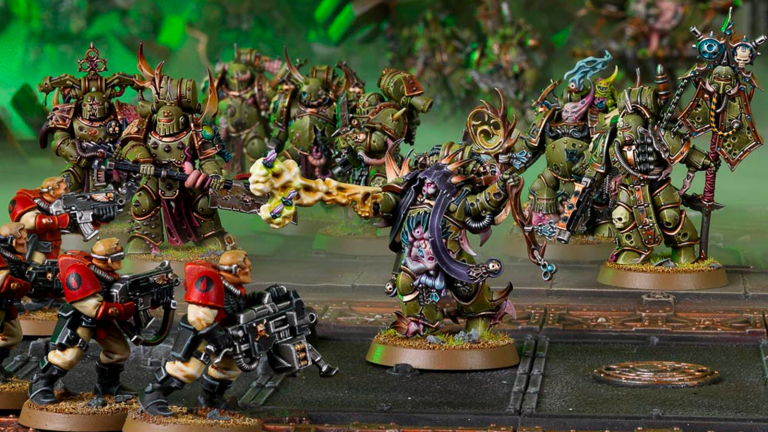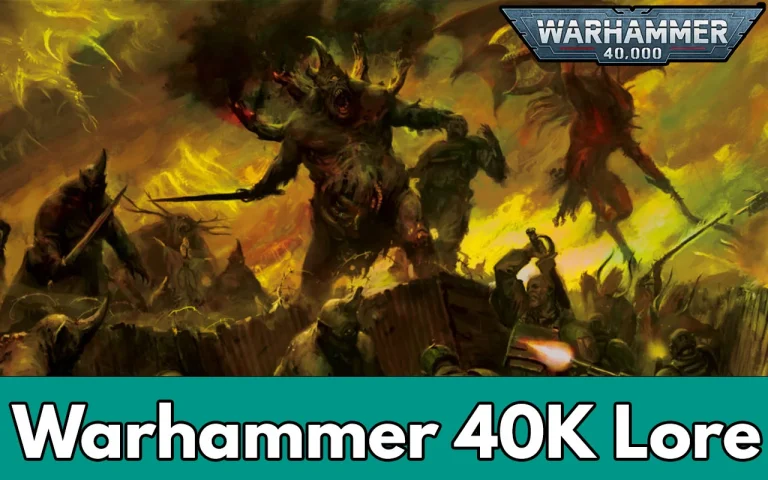Is Warhammer All One Universe?
If you’ve ever delved into the world of Warhammer, you might find yourself wondering, “Is Warhammer all one universe?” Well, my friend, buckle up because we’re about to dive into the intricacies of the Warhammer universe and explore whether it’s a cohesive, interconnected realm or a collection of separate entities. So, grab your sword, summon your courage, and let’s embark on this epic adventure together!
When it comes to Warhammer, it’s easy to get lost in the vastness of its lore and the multitude of games, books, and miniatures that make up its universe. But fear not, for I am here to guide you through the labyrinthine realms of Warhammer. While Warhammer encompasses various games and settings, such as Warhammer Fantasy Battles, Warhammer 40,000, and Age of Sigmar, the question remains: are they all part of the same grand tapestry or separate entities? Well, my curious companion, the answer is both yes and no.
Warhammer does indeed have multiple universes within its sprawling expanse. Each game system has its own distinct setting and rules, creating unique experiences for players and fans. However, there are also connections and overlapping elements between these different universes, hinting at a larger, interconnected narrative. So, while you can enjoy each game system as its own separate entity, if you look closely, you’ll discover threads that tie them together, making Warhammer a truly expansive and immersive universe. So, whether you’re a seasoned Warhammer veteran or a curious newcomer, prepare to be enthralled by the vastness and complexity of this epic saga.
Warhammer is not all one universe. It is actually comprised of multiple interconnected universes, each with its own distinct lore and characters. The two main universes in the Warhammer franchise are Warhammer 40,000 (also known as 40K) and Warhammer Age of Sigmar. While both universes share some similarities, they have separate storylines and settings. Warhammer 40,000 takes place in a dystopian future where humanity battles various alien races, while Warhammer Age of Sigmar is set in a realm of fantasy where gods, heroes, and monsters wage epic wars. So, while Warhammer encompasses a vast and rich universe, it is not a single cohesive entity.

Is Warhammer all one universe?
Warhammer is a popular tabletop game that has captured the imaginations of millions of players worldwide. But is Warhammer all one universe? The answer to that question is both yes and no. Let’s delve into the intricacies of the Warhammer universe and explore the different dimensions and settings within it.
The Warhammer Universe
The Warhammer universe is vast and expansive, encompassing multiple dimensions and timelines. At its core, Warhammer is divided into two main settings: Warhammer Fantasy Battles and Warhammer 40,000. These two settings share some similarities but are distinct in their own right.
Warhammer Fantasy Battles is set in a medieval-inspired world filled with fantastical creatures, epic battles, and rich lore. It is a world where knights, wizards, and monstrous creatures clash on the battlefield. The setting is known for its intricate world-building and complex political dynamics.
Warhammer 40,000, on the other hand, is a futuristic science fiction setting set in the 41st millennium. It is a dystopian universe where humanity is locked in a perpetual war against various alien races. The setting is characterized by its grimdark atmosphere and the constant struggle for survival.
Warhammer Fantasy Battles
Within the Warhammer Fantasy Battles setting, there are several distinct regions and factions. The Old World is the main setting of the game, a vast continent populated by various races such as humans, elves, dwarves, and orcs. Each race has its own unique culture, history, and conflicts.
One of the defining features of Warhammer Fantasy Battles is the Chaos Wastes, a chaotic realm where the forces of Chaos reign supreme. This realm is home to the Chaos Gods and their various minions, who seek to corrupt and destroy the mortal realms. The conflict between the forces of Order and Chaos is a central theme in the Warhammer Fantasy Battles setting.
Warhammer 40,000
In the Warhammer 40,000 setting, the galaxy is divided into various factions, each vying for control and survival. The Imperium of Man is the dominant force in the galaxy, but it is constantly under threat from alien races such as the Orks, Eldar, and Tyranids. The setting also introduces the concept of the Warp, a chaotic dimension that can be traversed through psychic abilities.
The Warhammer 40,000 setting is known for its vast array of armies, each with its own unique playstyle and backstory. From the genetically-enhanced Space Marines to the mechanized might of the Adeptus Mechanicus, there is no shortage of options for players to choose from.
Connected Dimensions
While Warhammer Fantasy Battles and Warhammer 40,000 are distinct settings, there are connections between them. In the lore, it is hinted that the two settings exist within the same multiverse, with characters and concepts crossing over between them.
For example, the Chaos Gods are present in both settings, albeit with some differences in their manifestations. Additionally, the concept of Chaos Space Marines in Warhammer 40,000 has roots in the Chaos Warriors of Warhammer Fantasy Battles. These connections add depth to the Warhammer universe and provide opportunities for crossover stories and gameplay.
Conclusion
In conclusion, while Warhammer is not all one universe in the traditional sense, it is a collection of interconnected dimensions and settings. The Warhammer Fantasy Battles and Warhammer 40,000 settings offer unique experiences and lore for players to explore. Whether you prefer the medieval fantasy of Warhammer Fantasy Battles or the grim darkness of Warhammer 40,000, there is something for everyone in the vast and rich tapestry of the Warhammer universe. So grab your dice, gather your armies, and prepare for battle in the realms of Warhammer.
Key Takeaways: Is Warhammer all one universe?
- Warhammer is a vast fictional universe created by Games Workshop.
- It consists of different interconnected settings, such as Warhammer 40,000 and Warhammer Age of Sigmar.
- Each setting has its own unique lore, characters, and rules.
- Despite being separate, these settings share some common elements and themes.
- Overall, Warhammer can be considered as one overarching universe with multiple interconnected dimensions.
Frequently Asked Questions:
1. Are all the different Warhammer games and settings part of the same universe?
Yes, all the different Warhammer games and settings are part of the same universe known as the Warhammer World. This shared universe provides a cohesive backdrop for various games, novels, and other media set in the Warhammer universe. However, it’s important to note that there are different time periods, factions, and storylines within this shared universe, offering diverse experiences for fans.
Whether you’re playing Warhammer Fantasy Battles, Warhammer 40,000, or exploring the rich lore through novels and tabletop games, you’ll find interconnected elements that contribute to the overarching Warhammer universe.
2. How do the different Warhammer settings relate to each other?
The different Warhammer settings, such as Warhammer Fantasy Battles and Warhammer 40,000, exist as separate time periods within the larger Warhammer universe. Warhammer Fantasy Battles is set in a medieval fantasy world, while Warhammer 40,000 takes place in a far future where humanity is locked in an endless war against various alien races.
Although they have distinct settings, both share common themes, such as epic battles, intricate lore, and a dark and gritty atmosphere. The events and characters in one setting may have an impact on the other, thanks to the interconnected nature of the Warhammer universe.
3. Can I use models from one Warhammer setting in another?
While the different Warhammer settings have their own unique rules and gameplay systems, there are opportunities to use models from one setting in another. For example, some players enjoy creating custom scenarios that combine elements from both Warhammer Fantasy Battles and Warhammer 40,000, allowing them to field armies from different time periods.
Additionally, Games Workshop, the company behind Warhammer, occasionally releases rules and supplements that enable cross-compatibility between different settings. This flexibility allows players to explore new possibilities and create their own narratives within the expansive Warhammer universe.
4. Are the storylines and events in Warhammer canon?
Yes, the storylines and events in Warhammer are considered canon within the Warhammer universe. Games Workshop, as the creator and custodian of the Warhammer IP, approves and oversees the development of lore and narratives that expand upon the existing canon.
However, it’s worth noting that the Warhammer universe is vast and constantly evolving. New editions, supplements, and novels may introduce new storylines and events that expand or alter the existing canon. This dynamic nature keeps the Warhammer universe fresh and allows for ongoing storytelling and exploration.
5. Are there any plans for future expansions or additions to the Warhammer universe?
Yes, Games Workshop is committed to expanding the Warhammer universe and regularly releases new content, expansions, and additions. Whether it’s new armies, rulebooks, novels, or video games, there is always something on the horizon for Warhammer fans to look forward to.
The company actively listens to the feedback and desires of the community, often incorporating fan ideas and suggestions into their releases. This collaborative approach ensures that the Warhammer universe continues to grow and captivate players and enthusiasts for years to come.
Is Warhammer 40k connected to Warhammer Fantasy/Age of Sigmar?
Final Summary: Is Warhammer all one universe?
After diving into the vast and intricate world of Warhammer, it is evident that it is indeed all one universe. From the grim darkness of Warhammer 40,000 to the epic battles of Warhammer Fantasy, these interconnected realms form a cohesive and expansive narrative that captivates fans worldwide. The shared lore, characters, and themes create a rich tapestry that has grown and evolved over the years, drawing in players and enthusiasts from various backgrounds.
Warhammer’s unified universe allows for endless possibilities and storytelling potential. Whether you’re a fan of science fiction or fantasy, there’s something for everyone within this expansive universe. The intricate web of interconnected events and factions adds depth and complexity, making it a truly immersive experience for both players and readers alike.
In conclusion, Warhammer’s all-encompassing universe has become a cornerstone of its success. It provides a cohesive and engaging narrative that spans across different mediums, captivating fans with its rich lore and diverse range of characters. Whether you’re a seasoned Warhammer enthusiast or a newcomer to the franchise, there’s no denying the allure and depth of this interconnected universe. So, grab your dice, paint your miniatures, and dive into the world of Warhammer, where epic battles and grand adventures await.






